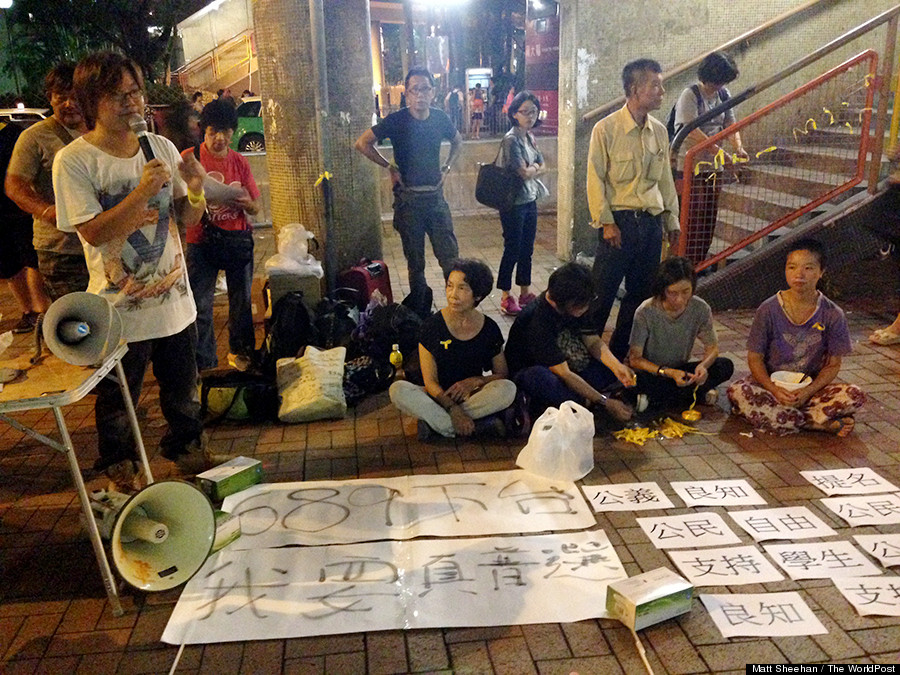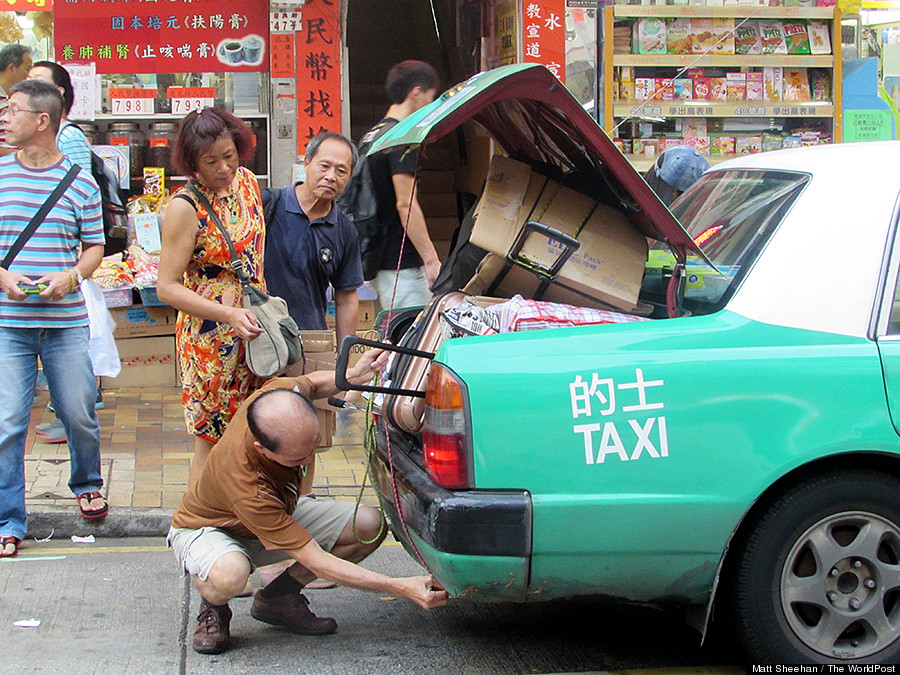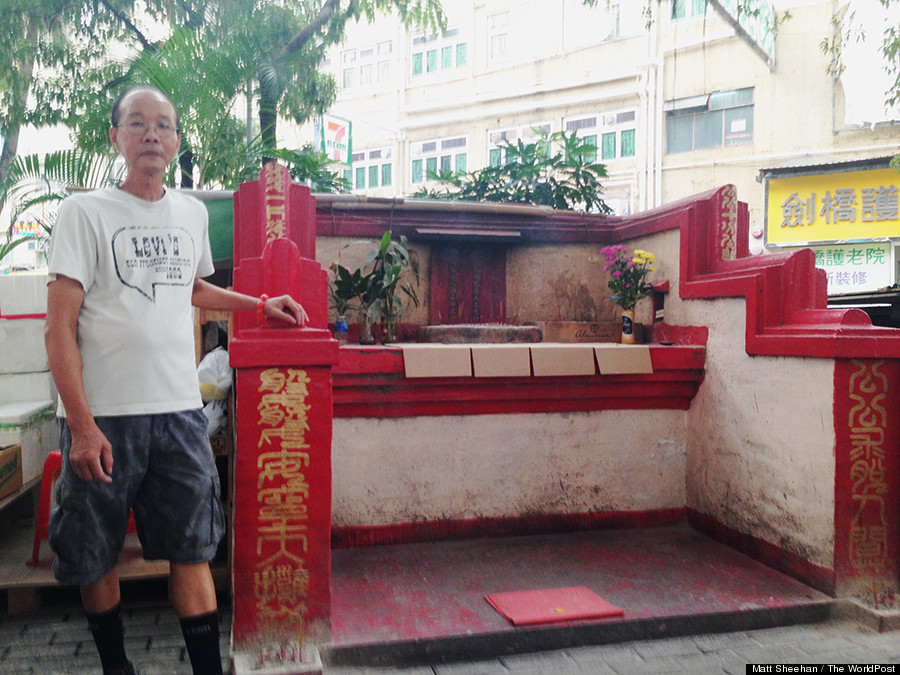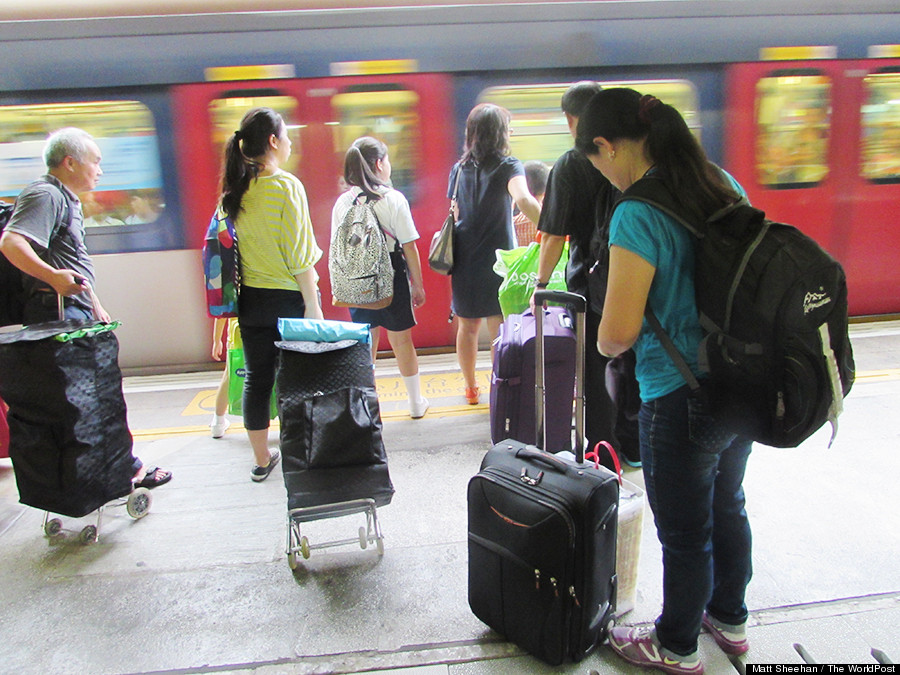SHEUNG SHUI, Hong Kong -- Banners blowing over Hong Kong’s protester-occupied streets demand the resignation of the city’s much-reviled chief executive, but here in Sheung Shui, a border town nestled between central Hong Kong and mainland China, many of the protesters rail against a different villain: milk powder smugglers.
“If you want to know why Hong Kongers don’t like the Chinese government, it’s that,” declared Yvonne Choy as she pointed at a woman sitting on two newly purchased cans of milk powder outside the Sheung Shui train station. “Everything is snatched up by them: our daily necessities, milk powder and diapers. Our study opportunities, job opportunities ... everything is gone just because the government lets them come.”
![rwanda]()
Protesters gather outside the Sheung Shui train station to demand democratic rights and a reduction in mainland visitors to Hong Kong. (Photo: Matt Sheehan/The WorldPost)
Choy, a young woman working part-time at a call center, delivered her diatribe during one of the first protests to take place in Sheung Shui. A small but vocal group of demonstrators gathered Monday night outside the train station, which was bustling with mainland Chinese visitors. Their voices represented the most distant echoes of the pro-democracy protests rocking central Hong Kong.
Once a quiet farming village, Sheung Shui now serves as a top destination for Chinese smugglers and shoppers hoping to snap up goods at discount prices. Hong Kong and mainland China maintain different customs and regulatory regimes for many foreign imports, which creates opportunities to profit off goods purchased in Hong Kong and illegally exported to the mainland.
When the Chinese government loosened travel to Hong Kong in 2009, it opened the floodgates for mainlanders engaged in smuggling activities involving everything from infant milk powder to iPhones. Foreign-brand milk powder has been a hot commodity ever since a 2008 safety scandal in China, and locals report that mainland runners continue to clear out Hong Kong shelves and skirt customs restrictions in pursuit of lucrative profits.
There are smugglers who make multiple cross-border runs a day to illegally import and resell goods. There are also many mainland buyers who travel to Hong Kong to make bulk purchases for friends and family. Together, their impact is tremendous.
![rwanda]()
Bulk buyers and smugglers load up on discount goods in Hong Kong before catching cabs and trains back to mainland China. (Photo: Matt Sheehan/The WorldPost)
Cross-border sales funnel money into local Hong Kong businesses, but also help fuel an anti-China upswell that taps deep cultural and economic anxieties. At their worst, those anxieties have led to public campaigns smearing mainlanders as “locusts” raiding Hong Kong’s resources and driving up prices.
“Hong Kong people, we have endured enough in silence,” read an infamous 2012 ad printed in the Apple Daily, a major Hong Kong newspaper. The ad featured a locust hovering over the skyline and railed against so-called birth tourism, demanding an end to “the unlimited infiltration of mainland Chinese couples into Hong Kong.”
Young protesters in central Hong Kong are striving to alter the political balance with Beijing, but places like Sheung Shui find themselves squarely on the horns of an economic dilemma. Many businesses rely on the demand from mainland buyers -- employees at the wholesale outlets that line Sheung Shui’s streets report 60 to 70 percent of their business comes from mainland shoppers. But that demand also sends prices of everyday goods skyrocketing for local residents.
![rwanda]()
Some local Sheung Shui residents blame mainland buyers for rising costs in the town, and that backlash has blended with the pro-democracy movement. (Photo: Matt Sheehan/The WorldPost)
“Housing price are soaring on speculation, and everything is becoming more expensive,” lamented Chan Wai-kuen, a 27-year-old pharmacy employee in Sheung Shui who wore the symbolic yellow ribbon of Hong Kong's protest movement. “What’s the use of having more customers?”
Home prices in Hong Kong have climbed 120 percent since 2008 and reached a record high last year. Those costs have turned the screws on the approximately 1.3 million Hong Kongers, one in five residents, who live below the poverty line.
Despite these tensions, there are many longtime Sheung Shui residents who take a benign view of the recent arrivals and instead cast a wary eye on the democracy movement. Tong Kai-leung, 61, moved to Hong Kong from neighboring Guangdong Province in 1982, right at the dawn of the economic reforms that would transform mainland China. Back then the town relied on rice farming, but as Hong Kong’s global trade ties expanded, Tong became a visa agent for international travelers. Now retired, he tends a small Buddhist shrine near the center of the town, and he sees trouble brewing with the protests.
![rwanda]()
Tong Kai-leung thinks that mainland visitors help business and blames democracy protests for upsetting the local economy. (Photo: Matt Sheehan/The WorldPost)
“They’re meaningless. They do no good to Hong Kong at all,” Tong said while sweeping up around the shrine. “Stocks are dropping, and people can’t commute to work because the traffic is blocked.”
He stopped his 25-year-old son from attending the protests in downtown Hong Kong.
“What’s democracy for?” Tong asked. “What’s the point in asking for democracy while losing the economy?”
But for 14-year-old Gary Cheung, the calculus is different. Born and raised in the nearby town of Tai Po, Cheung worries that Cantonese, the local language, and indeed Hong Kong’s culture are under threat at his school, where most of his classmates are recent arrivals from the mainland.
"Often I can't hear a single word in Cantonese," said Cheung. "People like me from Hong Kong have become the minority instead."
Cheung took that frustration to a major march and sit-in this July, where he was reportedly the youngest of more than 500 people arrested by local police.
For Yvonne Choy, the grievances growing out of the daily grind in her border town have begun to take on a political tint. While warning of rising crime rates due to new arrivals, she handed out fliers detailing desired election reforms. To date she hasn’t made it to the main occupy protests in central Hong Kong, but that may change soon.
“I’m getting ready to go,” Choy pledged.
![rwanda]()
The sight of mainland buyers loading up on bulk goods angers Yvonne Choy and has spurred her participation in local protests. (Photo: Matt Sheehan/The WorldPost)
“If you want to know why Hong Kongers don’t like the Chinese government, it’s that,” declared Yvonne Choy as she pointed at a woman sitting on two newly purchased cans of milk powder outside the Sheung Shui train station. “Everything is snatched up by them: our daily necessities, milk powder and diapers. Our study opportunities, job opportunities ... everything is gone just because the government lets them come.”

Choy, a young woman working part-time at a call center, delivered her diatribe during one of the first protests to take place in Sheung Shui. A small but vocal group of demonstrators gathered Monday night outside the train station, which was bustling with mainland Chinese visitors. Their voices represented the most distant echoes of the pro-democracy protests rocking central Hong Kong.
Once a quiet farming village, Sheung Shui now serves as a top destination for Chinese smugglers and shoppers hoping to snap up goods at discount prices. Hong Kong and mainland China maintain different customs and regulatory regimes for many foreign imports, which creates opportunities to profit off goods purchased in Hong Kong and illegally exported to the mainland.
When the Chinese government loosened travel to Hong Kong in 2009, it opened the floodgates for mainlanders engaged in smuggling activities involving everything from infant milk powder to iPhones. Foreign-brand milk powder has been a hot commodity ever since a 2008 safety scandal in China, and locals report that mainland runners continue to clear out Hong Kong shelves and skirt customs restrictions in pursuit of lucrative profits.
There are smugglers who make multiple cross-border runs a day to illegally import and resell goods. There are also many mainland buyers who travel to Hong Kong to make bulk purchases for friends and family. Together, their impact is tremendous.

Cross-border sales funnel money into local Hong Kong businesses, but also help fuel an anti-China upswell that taps deep cultural and economic anxieties. At their worst, those anxieties have led to public campaigns smearing mainlanders as “locusts” raiding Hong Kong’s resources and driving up prices.
“Hong Kong people, we have endured enough in silence,” read an infamous 2012 ad printed in the Apple Daily, a major Hong Kong newspaper. The ad featured a locust hovering over the skyline and railed against so-called birth tourism, demanding an end to “the unlimited infiltration of mainland Chinese couples into Hong Kong.”
Young protesters in central Hong Kong are striving to alter the political balance with Beijing, but places like Sheung Shui find themselves squarely on the horns of an economic dilemma. Many businesses rely on the demand from mainland buyers -- employees at the wholesale outlets that line Sheung Shui’s streets report 60 to 70 percent of their business comes from mainland shoppers. But that demand also sends prices of everyday goods skyrocketing for local residents.

“Housing price are soaring on speculation, and everything is becoming more expensive,” lamented Chan Wai-kuen, a 27-year-old pharmacy employee in Sheung Shui who wore the symbolic yellow ribbon of Hong Kong's protest movement. “What’s the use of having more customers?”
Home prices in Hong Kong have climbed 120 percent since 2008 and reached a record high last year. Those costs have turned the screws on the approximately 1.3 million Hong Kongers, one in five residents, who live below the poverty line.
Despite these tensions, there are many longtime Sheung Shui residents who take a benign view of the recent arrivals and instead cast a wary eye on the democracy movement. Tong Kai-leung, 61, moved to Hong Kong from neighboring Guangdong Province in 1982, right at the dawn of the economic reforms that would transform mainland China. Back then the town relied on rice farming, but as Hong Kong’s global trade ties expanded, Tong became a visa agent for international travelers. Now retired, he tends a small Buddhist shrine near the center of the town, and he sees trouble brewing with the protests.

“They’re meaningless. They do no good to Hong Kong at all,” Tong said while sweeping up around the shrine. “Stocks are dropping, and people can’t commute to work because the traffic is blocked.”
He stopped his 25-year-old son from attending the protests in downtown Hong Kong.
“What’s democracy for?” Tong asked. “What’s the point in asking for democracy while losing the economy?”
But for 14-year-old Gary Cheung, the calculus is different. Born and raised in the nearby town of Tai Po, Cheung worries that Cantonese, the local language, and indeed Hong Kong’s culture are under threat at his school, where most of his classmates are recent arrivals from the mainland.
"Often I can't hear a single word in Cantonese," said Cheung. "People like me from Hong Kong have become the minority instead."
Cheung took that frustration to a major march and sit-in this July, where he was reportedly the youngest of more than 500 people arrested by local police.
For Yvonne Choy, the grievances growing out of the daily grind in her border town have begun to take on a political tint. While warning of rising crime rates due to new arrivals, she handed out fliers detailing desired election reforms. To date she hasn’t made it to the main occupy protests in central Hong Kong, but that may change soon.
“I’m getting ready to go,” Choy pledged.
